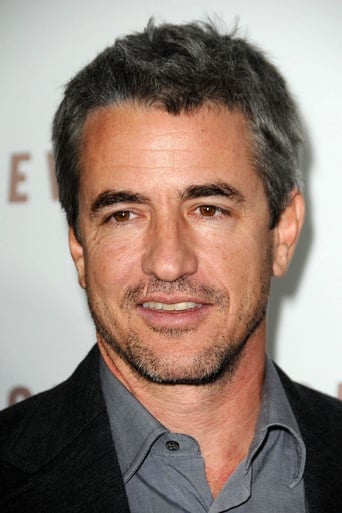Cubussoli
Very very predictable, including the post credit scene !!!
Wordiezett
So much average
Nayan Gough
A great movie, one of the best of this year. There was a bit of confusion at one point in the plot, but nothing serious.
Roxie
The thing I enjoyed most about the film is the fact that it doesn't shy away from being a super-sized-cliche;
CheshireCatsGrin
I caught this on Netflix tonight and was extremely disappointed. I understand the choice of grainy footage. It worked as well as the experimental bleached film did in Three Kings, which considering is in my top ten movies, says a lot. The ethical dilemmas throughout this film, until the final one, are realistic. Some doctors will bend the rules and play *wink wink nod nod* if a person can have lifesaving treatment in another country with a different set, or unenforced, rules as the child's Doctor did in this film. The mother opening up Harrison's (played expertly by Sam Shepard) medicine cabinet and the father confronting him on the golf course by mentioning the medications found which were all for post-transplant patients. Suddenly the father starts on what appears to be a wild goose chase to find Harrison's surgeon went on far too long. Most of us know by now how dangerous that area of Mexico is. While the mother is driving down to Mexico with ailing daughter, with a week left to live, in tow we finally feel some urgency. The ending from there is a let down.*spoiler* Once the street urchin was run over by the transplant surgeon's ordered motorcycle arrives at the hospital and has his chest open, along with a leg needing amputating, his chances of survival are very low. Yet suddenly the dying girls father has an ethical moment and allows his daughter to die so this child may, although in reality unlikely, live a full life. At the end we see him with a very western prosthesis with the other children living on the street. We also see the American couple bury their daughter . The mother, not forgiving the father, walks away from the funeral with anger at her husband. The husband, having taken the high road, is more comfortable with her death as a natural progression of her terminal disease.I'm sorry. Although not a parent, if I had the chance to save my child's life by transplanting the organs of a murdered child who already lost a leg and chest pried open my child would have his organs in a heartbeat. Not for the reason I believe the attempted murder was wrong: that wouldn't be a factor. I would accept the donated organ for the simple reason both children likely will die. Why not save one life?
Bob_the_Hobo
Paul and Diane Stanton (Dermot Mulroney and Diane Kruger) are living a comfortable life in Santa Fe, New Mexico but conflicted with their daughter's stage four lung disease. After months of waiting on the national waiting list so their daughter could get a replacement, Paul discovers a friend, gubernatorial candidate James Harrison (Sam Shepard) has had an illegal heart transplant. Harrison agrees to tell Paul all he knows, which sends Paul to Tijuana to find a mysterious Dr. Navarro, the man behind the curtain of illegal organ transplants. Organ transplants are just as dangerous and just as illegal as human trafficking, and can cause as much and more heartache. "Inhale" takes a regular family man and places him in war-torn Tijuana to try to save the life if his little girl using any means necessary, which makes you question his moral authority. Good films do just that, they make you think. Great films, however, leave you thinking. Dermot Mulroney doesn't usually play the leading character but gives a tour-de-force performance here. He is beaten and bruised on his journey but does not give up and held my attention throughout. The beautiful Diane Kruger is equally as good but underused as his frantic wife, tending to be a sidelines character who never gets her due. Sam Shepard successfully plays a slick politician, and the entire Hispanic cast, including the equally slick Jordi Molla, hold their own. The script has a few problems, mostly with explanation. Shepard's character's relationship to Mulroney's character is never quite explained. It appears they work together and are close, then suggests the opposite when Shepard is running for Governor. Kruger is underused, which takes away from much of "Inhale"'s potential. She is a fantastic actress but seeing her cry isn't enough. She's too good to be so one - dimensional, which suggests some of the film never made it off the cutting room floor. James Newton Howard's soundtrack blends seamlessly into the background, becoming a character in itself as it differentiates New Mexico and Mexico. The ending is perhaps the biggest fault of the film. The choices Paul makes throughout takes him to a surgical room where he is faced with an incredibly difficult choice. When we discover which choice he made, we are made to think if it was right. If we never knew, that would have left us thinking long after the screen went black. "Inhale" takes the organ trafficking debate head on, which is admirable. Yet the film isn't as good as the message it gets across.
MBunge
This movie has its problems but almost manages to overcome them with a compelling concept, quick pace and plenty of plot twists. Then a hugely unsatisfying conclusion, that gets dumber the more you think about it, short circuits all the dramatic and emotional tension of the story and reemphasizes all those problems you originally overlooked.Paul Stanton (Dermot Mulroney) is a New Mexico prosecutor whose daughter (Mia Stallard) is dying of a lung disease. Frustrated with America's transplant bureaucracy, Paul leaves his daughter and wife (Diane Kruger) behind and heads to Mexico, following a shadowy lead on a black market set of lungs. After being put through the wringer, Paul eventually unravels the mystery of "organ tourism" and is forced to confront the question he's been denying through the whole ordeal. Exactly how far is he willing to go to save his daughter's life?Now, Paul and his wife have essentially no personality other than their deep concern over their daughter and the first half of Inhale is littered with expository flashbacks that ultimately prove to be unnecessary. But the crisis facing the couple is so easy to identify with and Paul's pursuit of his daughter's salvation is so earnest and fraught with so many challenges that you don't really mind the characters being two dimensional. And the flashbacks end just as Paul's search for some lungs kicks into high gear, which allows the annoyance over their pointlessness to wash away.At this point, Dermot Mulroney's strong performance as a desperate father lost in the labyrinth of Juarez, Mexico has been enough to carry the film along as he races the clock to save his daughter. It's a simple, believable dilemma that holds your attention and the plot has been just unexpected enough to leave you anxious to see how it's all resolved. Inhale then races toward an ending which implodes in its stupidity. After hewing pretty close to realistic drama, the story dives deep into melodrama at the finish and then decides to skip over all the anguish and fallout the melodrama is meant to create. Paul Stanton is quite ludicrously put in the position of having to choose to save his daughter's life by killing another child but we don't get to see that decision made or any of the immediate consequences of it. The movie just cuts away to days or weeks later to let us know what Paul decided and then, like 30 seconds later, Inhale simply ends. The entire motion picture has been a boulder rolling downhill toward Paul's big decision but instead of giving the audience the crash its been waiting for and deserves, they're handed a wet noodle denouement and then kicked out of the story like it's an apartment and the viewer is 6 months behind on the rest.Oh, and at the end of this movie, Paul knows everything there is to know about this illegal organ-selling operation. He knows names, faces, locations, crimes and the way this thing ends, there's no reason in the world why Paul wouldn't or shouldn't go to the authorities and blow the whistle on the whole murderous scheme. Yet, the organ-sellers let Paul walk away, apparently trusting this now grief-stricken gringo to keep their secrets. And as Inhale ends, that's seems to be exactly what Paul did. These filmmakers clearly thought they were casting Paul as this tragic hero with their conclusion, but what they did was make him an accomplice to evil.A lot of good movies have flaws and what makes them good is that something about the story or its presentation transcends or overpowers those weaknesses. Inhale does the opposite, highlighting and exaggerating its problems until they can't be ignored. This film isn't a disaster but it is very disappointing.
d_art
In this new thriller from Icelandic director Baltasar Kormakur (The Sea), Santa Fe District Attorney Paul Chaney (Dermot Mulroney) and his wife Diane (Diane Kruger) has a daughter, Chloe, who is on a long list for a lung transplant due to a rare degenerative condition. As Chloe's health worsens, Paul becomes desperate for a donor and forgoes the usual channels to seek out a mysterious surgeon named Dr. Novarro in Juarez, Mexico, who may be able to help her. Things get complex when he finds that Dr. Novarro may have connections to a criminal underworld.The film starts off with a text on the screen about the increasing needs in the world for organ donors, similar in style of a documentary or a fact-based drama. We are soon introduced to Chloe, Paul and Diane's daughter with severe lung problems, establishing the motivations of the parents. While I first expected something more akin to a medical drama, majority of the film is actually closer to a thriller. It is a decent, if conventional, thriller.Majority of the film follows Paul (Dermot Mulroney) who goes off by himself to Mexico, searching for a "Dr. Novarro", a surgeon who apparently has access in finding a donor for his daughter. Paul, a white, upper-class gentleman with graying hair, sorely sticks out in this new and unfriendly environment. He is soon mugged by thugs and taken advantage of by street kids for snooping around in the wrong area. Many of the thugs are typically two-dimensional. Paul eventually makes some headway by enlisting help from one of the kids. I found it surprising that a District Attorney couldn't hire a language-friendly guide or bodyguards to get by in this type of environment, but I suppose that would make it less "edge-of-your-seat." AdvertisementDermor Mulroney is competent as Paul, who is constantly in the worst of places. Majority of the people he bumps into are unfriendly. Strange, extreme situations follow this character around--actually, it's more like he throws himself into these situations. Beyond that, his character is a fairly typical white collar character. Diane Kruger has a supporting role as Diane, Paul's wife. After Inglourious Basterds, Diane Kruger has become even more recognizable. She is underused here, and is away from most of the action, looking concerned in much of the film. Rosanna Arquette also has a small role as Dr. Rubin, which isn't developed. Most of the street characters in Mexico aren't developed beyond the obvious.The cinematography is well done. The film makes good use of its unfriendly, harsh environment with saturated colors and sharp contrasts, emphasizing the gritty, urban areas of Juarez, Mexico. The streets are filled with sharp greens, reds, and yellows. The thugs, the poor, and the children in the streets complete the whole mood. They are often more part of the environment than individuals. Many of them aren't too friendly. I'm curious how Mexicans would view this film. The hand-held camera shots, edits, and angles are all effectively done--the whole stylistic direction has a certain Tony Scott feel.As for the story, it's nothing too new, especially when it focuses on the events in Mexico. It works like a simple detective story--one clue leads to another. There are a good amount of violence and sexually explicit situations, many of which seem to exist purely for shock value than to further the theme or the plot. While the film regains its focus down the line, there are many things going on that seem sensational--shady politicians, conspiracies, and exploitation of the poor. Some parts were implausible, if well-intended, which took me away from the film. Overall, I did appreciate the theme of this film, which was driven home fairly effectively near the end. Still, I don't think the film's message was helped by all the clutter--clichés, shocks, and stylistic chases. You can also follow my movie reviews on twitter.com/d_art




